By Aaron Earls
LifeWay Christian Resources
 NASHVILLE — As legislatures in Washington, D.C. and across the country discuss issues surrounding individuals who identify as a gender different from their biological sex, a clear majority of U.S. Protestant pastors see such gender fluidity as morally wrong.
NASHVILLE — As legislatures in Washington, D.C. and across the country discuss issues surrounding individuals who identify as a gender different from their biological sex, a clear majority of U.S. Protestant pastors see such gender fluidity as morally wrong.
In a study from Nashville-based Lifeway Research, around 3 in 4 Protestant pastors say identifying as a gender different from one’s biological birth gender is morally wrong. Similar numbers say the same about attempts to physically change genders.
“American culture increasingly views morality differently than historic Christianity,” said Scott McConnell, executive director of Lifeway Research. “When pastors articulate Christian teaching, it often sounds very different from the cultural narrative because it rejects a basis for morality centered on the individual.”
Identity issues
Among U.S. Protestant pastors, Lifeway Research found 72 percent say it is morally wrong for an individual to identify with a gender different from the biological sex they were born, including 62 percent who strongly agree. Around 1 in 7 (14 percent) disagree, and another 10 percent do not believe it is a moral issue.
In an earlier study Lifeway Research asked the same questions of Americans. Forty-four percent of Protestant Americans and 35 percent of all Americans agreed it is morally wrong for someone to identify with a gender different from the sex they were born. In the 2020 State of Theology study from Lifeway Research, however, 79 percent of American adults agree God created male and female.
“Protestant pastors are more likely than Americans who identify as Protestant to consider it wrong to identify as a gender different from your biological sex,” said McConnell. “While most Americans accept the biblical narrative of God designing male and female, pastors take changing that design much more seriously.”
Evangelical pastors are more than twice as likely as mainline Protestant pastors to agree identifying with a different gender is immoral (84 percent to 32 percent).
Denominationally, Pentecostals (90 percent) and Baptists (89 percent) are more likely to agree than pastors in the Restoration movement (69 percent), Lutherans (60 percent), Presbyterian/Reformed pastors (45 percent) and Methodists (43 percent).
Protestant pastors in the Northeast are the most likely to say this is not a moral issue (17 percent).
Gender changes
More than 3 in 4 pastors (77 percent) say it is morally wrong to change the gender you were born with through surgery or taking hormones, with 71 percent strongly agreeing. Fewer than 1 in 8 disagree (12 percent), and 7 percent say it’s not a moral issue, according to the Lifeway Research study.
“Whether it is a physical sex-change or public identification, a large majority of pastors see a person’s biological sex as something a human should not change,” said McConnell.
Evangelical pastors are again more than twice as likely as mainline pastors to say this is immoral. Nine in 10 evangelical pastors (90 percent) believe attempting to physically change genders is morally wrong, compared to 37 percent of mainline pastors.
Denominational groups also have a similar breakdown as the previous question. Pentecostals (96 percent) and Baptists (94 percent) are more likely to view attempts to change gender as immoral than Restorationist movement pastors (75 percent), Lutherans (69 percent), Presbyterian/Reformed pastors (49 percent) and Methodists (48 percent).
Personal knowledge
The latest estimation from Gallup finds 0.6 percent of the U.S. adult population identifies as transgender. Only among the youngest generations does the amount top 1 percent—1.2 percent of millennials and 1.8 percent of Generation Z.
Still, according to the Lifeway Research study, close to half of pastors (48 percent) say they know someone who is transgender. Slightly fewer (41 percent) say they don’t know any individuals who identify as transgender, while 11 percent say not that they know of.
In 2015, Lifeway Research found 27 percent of Americans personally knew someone who identifies as transgender.
Mainline pastors are more likely than evangelicals to say they know someone who identifies as transgender (63 percent to 45 percent). Methodists (63 percent) are more likely to know an individual who identifies as transgender than are Restorationist movement pastors (47 percent), Lutherans (47 percent), Pentecostals (40 percent) and Baptists (39 percent).
Pastors who are of other ethnicities (57 percent) are more likely than African American pastors (36 percent) to say they personally know someone who identifies as transgender. White pastors are in between at 48 percent.
Additionally, pastors with graduate degrees and pastors of churches with more than 250 people are more likely to say they know someone who identifies as transgender.
“Despite close to half of pastors saying they personally know someone who identifies as transgender, most still view identifying as a different gender as immoral,” said McConnell. “As lawmakers debate establishing protections for those who identify as a different gender from their biological sex at birth, it waits to be seen if Congress will seek to force pastors and their churches to implement changes contradictory to their religious convictions.”
